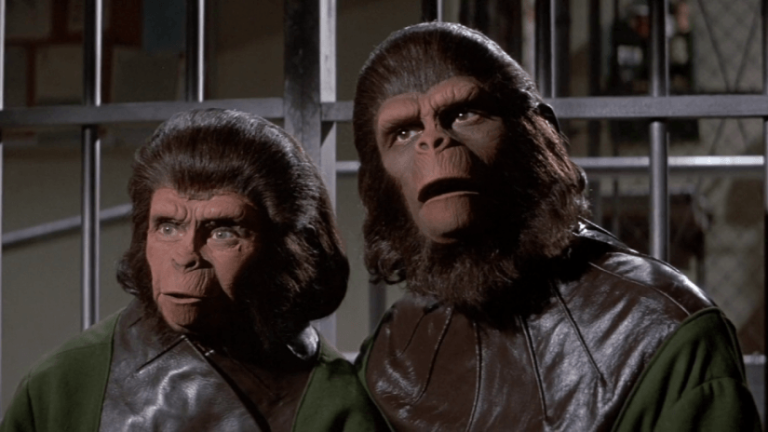There is a scene in Escape from the Planet of the Apes in which the film’s antagonist Dr. Hasslein debates with the president of the United States as to whether or not they should kill two talking apes who have traveled from a future where apes rule the world. Hasslein considers it likely that the pair will have a child that initiates the downfall of humanity. The president says even if that’s the case the two apes have done nothing wrong, and poses the following question to Hasslein: “Given the power to alter the future, have we the right to use it?” Hasslein has no response, because the president and Hasslein are speaking past each other; the president is asking a question of morality while Hasslein is speaking only of science.
Escape from the Planet of the Apes was first released 50 years ago this weekend, and though it is in many ways a profoundly silly movie, at its heart the movie is about the role of science in society, posing questions and provoking thought in a way that is still relevant today.
The movie opens with the U.S. military coming across a spaceship that has landed in the sea, the same spaceship that astronaut George Taylor had piloted in the first film in the Planet of the Apes franchise. But instead of Taylor returning, three chimps walk out of the craft: Dr. Milo (Sal Mineo) and married couple Cornelius (Roddy McDowall) and Zira (Kim Hunter). Milo is quickly killed in an accident with a gorilla at a zoo where they were stored before the humans realize the apes are intelligent. Cornelius and Zira then reveal themselves to the authorities, trying to disguise the fact that they come from Earth’s future, where they lived in a society that thought so little of humans Zira dissected them alive without a second thought. Hasslein (Eric Braeden) spots inconsistencies in their story and tricks Zira into revealing more before bringing the pair in for questioning. Cornelius informs him that at some point in the future apes acquire the gift of speech, then start an uprising against the humans. Ultimately, an ape war in the future leads to the complete destruction of the planet, an outcome Hasslein is eager to avoid. As Zira is pregnant, and believing that her child could create more speaking progeny with non-speaking apes of present day, Hasslein sets about trying to convince the government to abort the child and possibly kill Cornelius and Zira.
Hasslein represents the idea of a scientist guided only by science. It isn’t hard to find real world examples of such figures, like Bill Nye suggesting population control ought to be considered to save the planet or Richard Dawkins saying just last week that it is “wise and sensible” to abort children with Down Syndrome to increase the happiness of the world. And Escape from the Planet of the Apes shows how such thinking is incredibly narrow-sighted.
Hasslein has no broader moral framework with which he can approach the problem of human survival and so, bereft of any principles that he can work from, he ends up advocating for the execution of Cornelius, Zira, and their unborn child, none of whom have done anything to merit such treatment. This avenue of action is so inherently immoral that though it sounds logical—prevent smart apes from procreating to prevent smart apes from destroying the world—most people would recoil at the suggestion. Ending innocent life is simply wrong. But viewing people (or highly intelligent apes) as nothing more than abstractions, chess pieces in the game of the survival of the human race, leads Hasslein and scientists like him to lose sight of this.
Ironically, it’s this narrow-thinking that leads Hasslein to set in motion the very chain of events that ensures the future by which he was so terrified. Zira gives birth to a son, whom she names Milo and whom she hides in a zoo. Cornelius and Zira are killed and Milo grows up an orphan. Future films in the Planet of the Apes franchise show that he leads the ape revolt.
Science is a tool for observing the world, not a guide for how to act in it. It can tell you certain things but it does not contextualize its own information and neither can it act upon it. And turning to it for moral guidance can lead to deeply immoral actions, whether you’re a fictional scientist in a movie about super intelligent apes or a real life scientist discussing abortion.







Please note that we at The Dispatch hold ourselves, our work, and our commenters to a higher standard than other places on the internet. We welcome comments that foster genuine debate or discussion—including comments critical of us or our work—but responses that include ad hominem attacks on fellow Dispatch members or are intended to stoke fear and anger may be moderated.
You are currently using a limited time guest pass and do not have access to commenting. Consider subscribing to join the conversation.
With your membership, you only have the ability to comment on The Morning Dispatch articles. Consider upgrading to join the conversation everywhere.